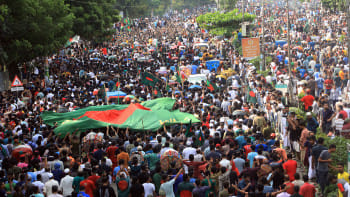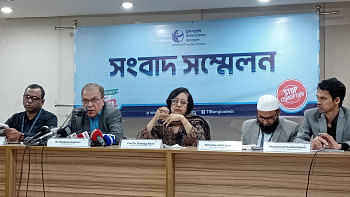The banality of evil and the Messiah of a new dawn

Just hours after sending off our last op-ed for publication, we watched the unthinkable unfold: the resignation and departure of Sheikh Hasina, followed by the storming of Gono Bhaban. Indeed, no sooner had the army chief announced an upcoming address to the nation that the jubilation on the streets began, accompanied by a wave of looting and destruction. We witnessed a couple showing off expensive jamdani sarees, while others carried off an eclectic train of booty: from live pangash fish to bras and TVs. Men appearing in sarees and high heels, some putting up their legs and smoking cigarettes inside Shangshad Bhaban, portrayed a sudden "carnivalesque" inversion of hierarchies. A photo surfaced of one of our cousins and his friends—all highly educated and affluent—looting expensive paintings from Sheikh Rehana's house; he would later be praised for apologising. To some, these constituted radical political acts and a moment of catharsis. All we could think of, however, was the "banality of evil."
In her 1963 study of the trial of the Nazi war criminal Adolf Eichmann, Hannah Arendt developed the concept of the "banality of evil" to account for a paradox central to all violent social orders/events: how otherwise "ordinary" people can commit acts of unspeakable evil in the process of performing their mundane duties, neither driven by malice nor incapable of imagining otherwise. One recalls, for example, the police sent to brutalise the student protesters just days ago, deployed as disposable bodies and then abandoned when the tide turned. Some may balk at this comparison, but the banality of evil extends well beyond the problem of "following orders." It is the ability to perform acts that would be unthinkable under "ordinary" circumstances, but can appear mundane, even commendable, under others.
For three days we were a state without a government. The police had abandoned their posts out of fear for their lives, and although the army had supposedly taken charge, they were clearly unwilling to intervene. As the student coordinators became embroiled in closed door talks about the interim government, the students on the ground cleaned up the streets and government buildings, secured and returned some of the booty, took control of traffic, and began to erase the marks of violence with their murals. Within hours of Hasina's departure, news of robberies, arson, the destruction of monuments and sculptures, and attacks on minorities, the police, and anyone affiliated with the AL began to spread like wildfire. Many condemned these acts, while others justified them as legitimate acts of vengeance (or even an AL ploy to portray a nation in disarray). Many seemed to be more concerned about fearmongering Indian media narratives; perhaps they are not hearing the first-hand accounts that we are. And while we are rightly celebrating the way students and community members have pulled together to defend their neighbours, it is worth asking why so many of us should suddenly have to live in fear for their lives whenever the state begins to morph, or disappear from view.
Everything has a past. From 1947 to 1964 to 1971, such seemingly mindless vandalism and the appropriation of "enemy" lands/property (almost always orchestrated by vested interests and neighbours rather than strangers) has shaped the entitlements of certain citizens over others. With every shift in the political settlement, whoever was not on the right side of history became minorities or enemies, their lives and property up for grabs, legitimised through vested-property laws. And just like we would like to forget the plunder of Hindu property after Partition or the massacre of Biharis during and after 1971, so the majority today is loath to admit the foundational violence that is marking the birth of a new order. Then as in now, good Samaritans formed community-based groups to protect against such attacks. This is neither new, nor is it merely revenge; this is nation-making. Delineating the current violence as a kind of random, chaotic outburst—as a law-and-order or "dakat" problem—severs this historical link. It frees the rest of us from culpability. It overlooks the bottom-up violence of thugs and opportunists that the previous regime also relied on, and obscures the majoritarian, populist echoes that the quota-reform movement carried from the very beginning.
Mass uprisings are intoxicating, and they create a range of possibilities within the political field. This interim government—an economist and Nobel laureate leading an eclectic mix of human rights defenders, environmentalists, veteran NGO activists, students, lawyers, retired defence officers, a psychologist, an Islamic scholar, and even a representative from indigenous communities—shows us such possibilities. The pendulum swung from the erstwhile radical left to the right to the neoliberal "centre," as is usually the case in any populist uprising.
As social scientists, it would be naive to believe that this motley crew came together randomly. Let us not forget that just like these students, many of these cabinet members carry visceral memories of repression and harassment by the previous regime. Yunus was dragged through the mud and to the courts, Syeda Rizwana came under attack for standing against land grabbers, Adilur Rahman faced arrest for Odhikar's report on the 2013 Shapla Chottor crackdown, and one can imagine the repercussions of Farida Akhter's defence of Hefazat-e-Islam's 13-point demands. They have all paid the price for dissent, and all the "Avengers" have now assembled. Time will tell what this "union of the repressed" will result in.
While hopes are running high, this is also the time to ask questions (what kind of development agenda we can expect from the doyen of microfinance, for example), and not give in to some fear of "maligning" the movement. This is also the hour to remember that what was not possible in 2006/7 and 2013 has suddenly become possible in 2024. We want to believe that our student leaders have done their homework and can continue to sense the pulse of the masses, that this impossible combination that has taken custody can provide the magical solution that we keep reaching for. We have summoned the forces of civil society to take charge and dispel the party-state; we hope that they will be able to return to their roles as mediators between the state and the people once their time is over. Their task is to free the organs of government and the state from the shadow of party-rule, not to rely on another kind of force on the ground to push agendas and hunt for new enemies. We must not repeat the mistakes of the post-71 list-makers, who had labelled the millions who did not fight or flee during the war—including many who had continued in their government jobs—as "collaborators," producing a new economy of accusations (Mohaiemen, 2015). By now our students should be able to put down the sticks and go back to their classes. They have led the way; the rest is up to you (and us) to deliver.
Seuty Sabur and Shehzad M Arifeen teach anthropology at the Department of Economics and Social Sciences, School of Humanities and Social Sciences, BRAC University.
Views expressed in this article are the author's own.
Follow The Daily Star Opinion on Facebook for the latest opinions, commentaries and analyses by experts and professionals. To contribute your article or letter to The Daily Star Opinion, see our guidelines for submission.


 For all latest news, follow The Daily Star's Google News channel.
For all latest news, follow The Daily Star's Google News channel. 










Comments